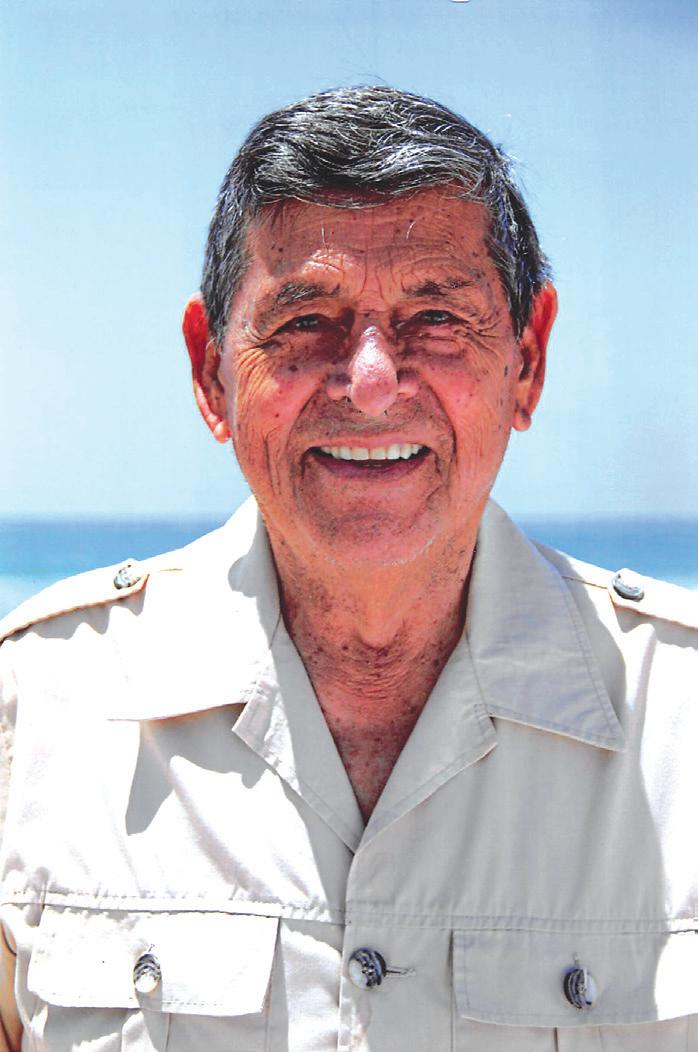
3 minute read
Julian Nava
Is Remembered for a Long, Well-lived Life
By the Nava family, https://www.juliannava.com/
Advertisement
Julian Nava (1927–2022) was born in Los Angeles in 1927, to parents who had emigrated from Zacatecas during the era of the Mexican Revolution. He and his seven siblings grew up in Boyle Heights, where they attended public school, played sports in public parks, and participated in church youth activities with ethnically diverse peers.
Despite the economic challenges resulting from the Great Depression, and discrimination against Mexican Americans, Nava and all his siblings graduated from high school. All three Nava sons volunteered for the U.S. armed forces, with Nava volunteering to serve in the Navy at the age of 17.
Nava graduated from East Los Angeles Junior College, Pomona College, and Harvard University, where he earned a PhD in Latin American history. He worked in higher education in Puerto Rico, Spain, and Colombia, before joining San Fernando Valley State College (renamed California State University Northridge in 1972) as founding faculty in the Department of History.
At Cal State Northridge, in addition to teaching Latin American History, Nava helped develop what became the Chicano Studies program. He wrote widely on Latin American history and U.S. history, with a focus on the importance of the Mexican American experience in the United States. He also wrote numerous K–12 textbooks and teacher training materials.
In 1967, Nava was elected to the Los Angeles Unified School District Board of Education, the first Mexican American to be elected to this city-wide board (and the first Mexican elected city-wide since Edward Roybal, to the Los Angeles City Council in 1949). Nava worked to improve educational access for all and advocated for bilingual and multicultural education.
He began his service on the board in the dynamic context of the 1968 East Los Angeles high school student protests, and then the 1970 Los Angeles Superior Court order to desegregate Los Angeles public schools. Nava was elected to three terms of office, serving twice as board president. In 1980, President Jimmy Carter appointed Nava as U.S. Ambassador to Mexico.
Ever the professor, Nava also sought to connect with a broad public audience. In 1970, he collaborated with Sal Castro, a leader of the 1968 student walkouts, to create a television show about the historical and cultural experience of the Mexican American community from a Chicano perspective. Chicano: The Mexican American Heritage Series (I & II) first aired on the Los Angeles NBC TV station in July 1971.
During his retirement, Nava wrote and produced several documentary films, including Song of the Basque (1995) and Voices of Cuba (1996).
Nava and his wife Patricia raised their three children in Los Angeles, and then retired to San Diego. In retirement, he continued to enjoy lifelong interests in photography, painting, gardening, and woodwork. His passion for learning through travel led him to visit more than 20 countries on four continents.
Nava continued to volunteer with community organizations through his last year of life, but mostly enjoyed spending time with family—especially his six grandchildren.
“We lost a major figure in Latino education and politics with the passing of Julian Nava at 95,” says Kirk Whisler, the board president of Empowering Latino Futures. Whisler remembers him well with the following words.
“I really got to know Julian in the mid1970s, when we served together on the
Commission of the Californias. Over the next two decades, we worked on a couple of media projects and one political effort. Almost 20 years ago Julian agreed to become a board member of what is now Empowering Latino Futures, quickly becoming our first Vice President of Education. Over the past 20 years, I was blessed to work with him on a variety of community and publishing efforts, and even a few political endeavors.
Julian’s career was a series of firsts— one of the first U.S.-born Mexican Americans to get a PhD from Harvard; the first Latino to serve on the Los Angeles Unified School District Board in 1967; and the first Mexican American to serve as U.S. Ambassador to Mexico, in 1980. Through his educational and political engagement, Julian easily impacted thousands of people over the decades.
We took several long trips, where I loved getting insight on his career and soaking up details about the critical founding of the Community Services Organization, about problems in politics and in education systems, and so much more. Julian’s yearning to learn never waned, nor did his desire to share his wonderful insights based on his decades-long experience, which he always delivered with his keen wit. It is what I will miss most about him.”










